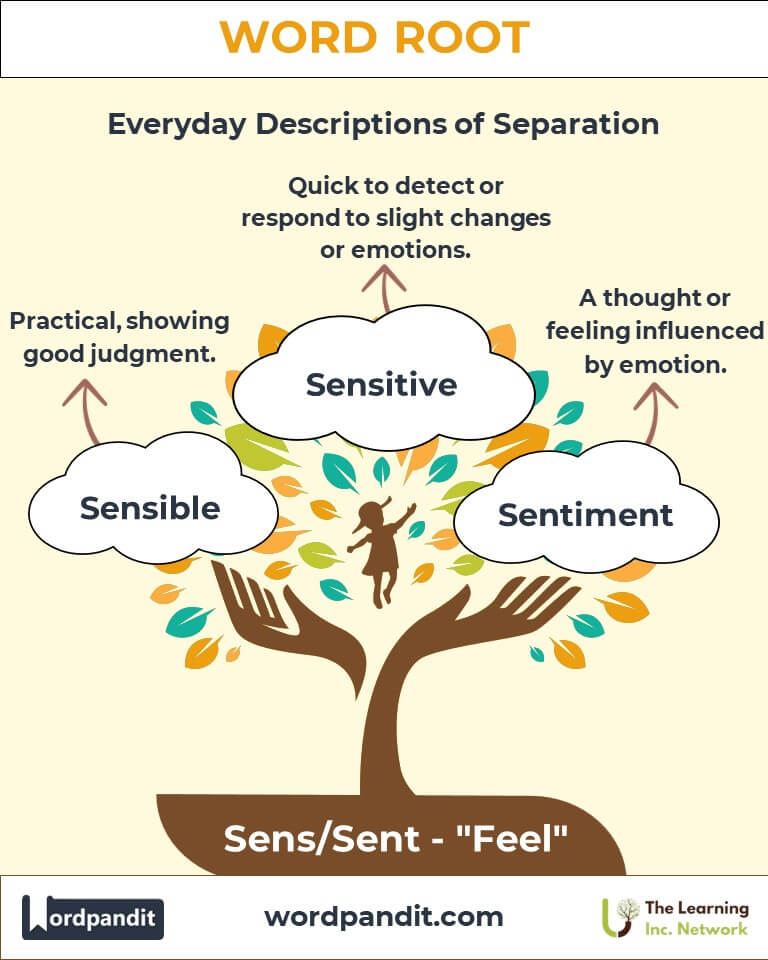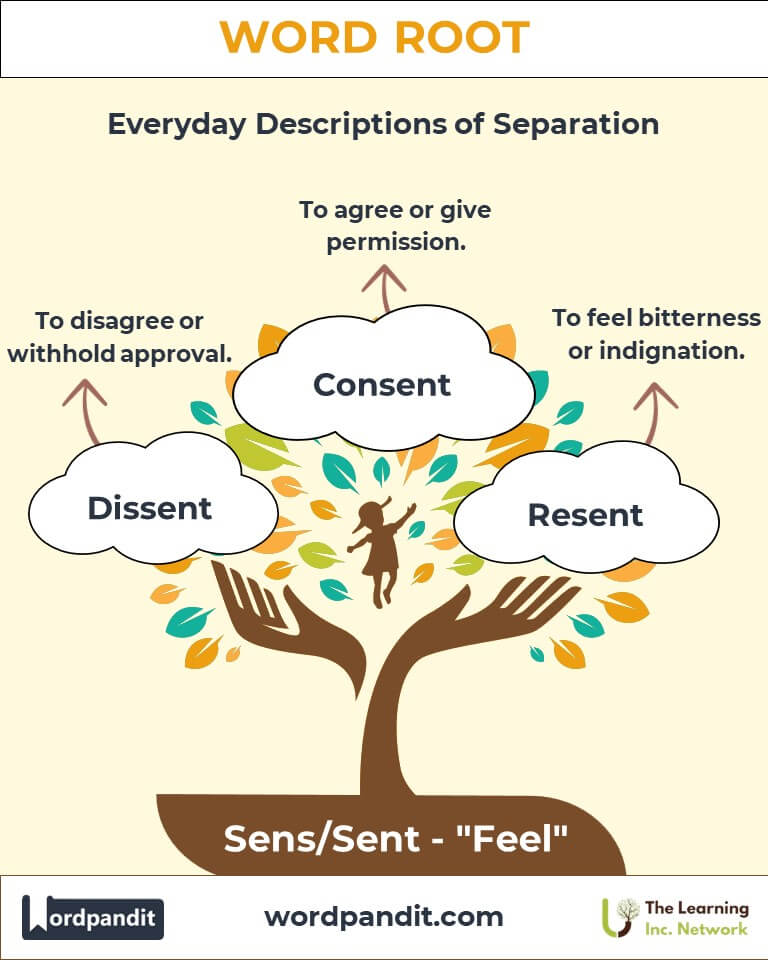Sens and Sent: The Roots of Feeling in Language and Expression
Byline: Delve into the fascinating world of the word roots "sens" and "sent," derived from the Latin roots for "feel." From everyday terms like "sensible" to profound expressions like "sentiment," these roots form the backbone of words that articulate our emotions, perceptions, and judgments.

Table of Contents
- Introduction: The Essence of Sens and Sent
- Etymology and Historical Journey
- Mnemonic: Unlocking the Power of Sens and Sent
- Common Sens and Sent-Related Terms
- Sens and Sent Through Time
- Sens and Sent in Specialized Fields
- Illustrative Story: Sens and Sent in Action
- Cultural Significance of Sens and Sent
- The Sens and Sent Family Tree
- FAQs About the Sens and Sent Word Root
- Test Your Knowledge: Sens and Sent Word Root Quiz
- Conclusion: The Living Legacy of Sens and Sent
1. Introduction: The Essence of Sens and Sent
Have you ever described someone as "sensitive" or expressed a "sentiment"? These words owe their richness to the roots "sens" and "sent," which mean "feel." Originating from Latin, these roots have shaped a vast array of words in English, helping us communicate emotions, perceptions, and judgments. Whether in poetry, psychology, or everyday conversation, "sens" and "sent" underscore the human capacity to feel deeply and think critically.

2. Etymology and Historical Journey
The roots "sens" and "sent" derive from the Latin words sentire (to feel, perceive) and sensus (feeling, perception). These terms entered Old French as sentir before making their way into Middle English. Over centuries, they expanded their influence, forming words that capture everything from physical sensations to emotional experiences and intellectual judgments.
3. Mnemonic: Unlocking the Power of Sens and Sent
Imagine a heart radiating vibrant waves of light, symbolizing feelings (sens) and messages (sent). Here’s a mnemonic:
Mnemonic Device: "Sens is to sense, and Sent is to be sent on a heartfelt mission of feeling."
4. Common Sens and Sent-Related Terms
- Sensible (sen-si-buhl): Practical, showing good judgment.
Example: "It was a sensible decision to save for the future." - Sentiment (sen-ti-ment): A thought or feeling influenced by emotion.
Example: "Her speech was filled with genuine sentiment." - Sensitive (sen-si-tiv): Quick to detect or respond to slight changes or emotions.
Example: "He’s very sensitive to criticism." - Consent (kuhn-sent): To agree or give permission.
Example: "She gave her consent to the project proposal." - Dissent (di-sent): To disagree or withhold approval.
Example: "The judge’s dissent highlighted key legal issues." - Resent (ree-sent): To feel bitterness or indignation.
Example: "She began to resent the constant interruptions."
5. Sens and Sent Through Time
- Sensible:
- Early Usage: Initially meant "perceptible by the senses."
- Modern Meaning: Now relates to practicality and sound judgment.
- Sentiment:
- Shift: From philosophical musings in the 18th century to personal emotions in contemporary usage.
6. Sens and Sent in Specialized Fields
- Psychology: Sensory Processing: The study of how people perceive stimuli.
- Law: Consent: Central to contracts and ethical decision-making.
- Literature: Sentimentality: A writing style evoking deep emotions.
- Technology: Sentient AI: Hypothetical AI systems capable of feeling and perception.
7. Illustrative Story: Sens and Sent in Action
Sophia, a young journalist, prepared an article on community resilience. While interviewing a local artist, she sensed the deep sentiment in his work, reflecting hope and healing. Her sensitive portrayal of his journey resonated widely, illustrating the profound impact of empathy in storytelling.
8. Cultural Significance of Sens and Sent
The roots "sens" and "sent" have shaped cultural discourse on emotion and perception. In literature, they explore human vulnerability and connection. Philosophical debates on "sentience" question what it means to feel or be aware, influencing ethics and artificial intelligence.

9. The Sens and Sent Family Tree
- Path (Greek: feeling, disease):
- Empathy: The ability to share and understand another's feelings.
- Pathology: The study of disease.
- Aesth (Greek: perception):
- Aesthetic: Concerned with beauty or artistic taste.
- Anesthesia: Loss of sensation or awareness.

10. FAQs About " Sens" and "Sent "
Q: What do "sens" and "sent" mean?
A: Both roots mean "feel" and come from the Latin sentire, meaning "to perceive" or "to feel." These roots appear in words related to emotional and physical sensation, such as "sensible" (practical and guided by feelings of judgment) and "sentiment" (a feeling or opinion influenced by emotion).
Q: What is the difference between "sensible" and "sensitive"?
A: "Sensible" refers to being practical, reasonable, or guided by sound judgment. For instance, "It’s sensible to save money for emergencies." "Sensitive" describes the ability to detect or respond quickly to stimuli, emotions, or changes. Example: "Her sensitive nature makes her an empathetic listener."
Q: What is the meaning of "sentience"?
A: Sentience refers to the ability to feel, perceive, or experience subjectively. It is often used in discussions about animals, artificial intelligence, or consciousness. For example, "Sentient beings are capable of pain and pleasure."
Q: Are "resent" and "dissent" related?
A: Yes, both words share the "sent" root, but their prefixes change the meaning. "Resent" (re- + sentire) means "to feel bitterness or indignation again." For example, "She resented being overlooked for the promotion." "Dissent" (dis- + sentire) means "to feel differently or disagree." Example: "The lone dissent in the meeting highlighted alternative perspectives."
Q: What does "consent" imply in legal or ethical contexts?
A: Consent refers to agreeing or giving permission willingly after understanding the implications. For instance, informed consent is crucial in medical procedures to ensure patients are aware of risks and benefits before proceeding.
11. Test Your Knowledge: "Sens" and " Sent " Mastery Quiz
1. What does the root "sent" mean?
2. Which word means "to agree"?
3. What does "sensitive" describe?
4. Which term relates to emotional expression?
5. What does "resent" mean?
12. Conclusion: The Living Legacy of Sens and Sent
The roots "sens" and "sent" illuminate the beauty of human emotion and perception. Their influence spans language, culture, and technology, connecting us through shared experiences and insights. As we continue to explore these roots, they remind us of the importance of feeling, empathy, and understanding in shaping a compassionate world.












